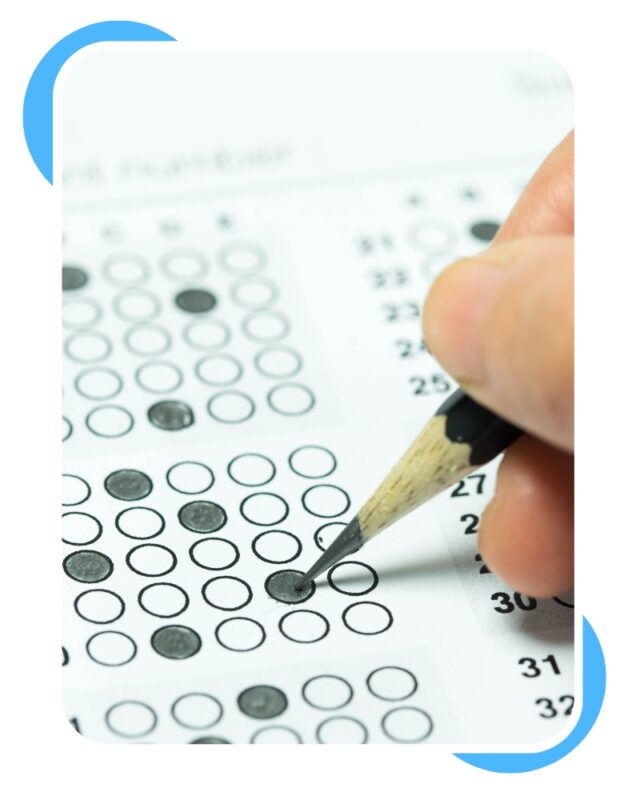
The SAT, also known as the Scholastic Assessment Test, is a standardized exam that holds significant importance in the college admissions process within the United States. The test is designed to measure a student’s readiness for college-level coursework and assess their critical thinking, problem-solving, and writing skills. The SAT is typically taken by high school juniors and seniors and covers three main areas: Reading, Writing and Language, and Math. The SAT is scored on a scale of 400 to 1600, with separate scores for each section ranging from 200 to 800. Colleges and universities use SAT scores, along with other factors such as grades, extracurricular activities, and essays, to make admissions decisions. Understanding the format, content, and scoring of the SAT can help students prepare for this important exam and increase their chances of being accepted into their desired college or university.

An important Date & Time for SAT 2023-2024 Exam
The SAT exam for the 2023-2024 academic year will be administered on various dates throughout the year. The College Board, which oversees the SAT, has released the test dates for the upcoming academic year. The first administration of the SAT will take place on August 27, 2023, followed by tests on October 1, November 5, December 3, 2023, and then on March 11, May 6, and June 3, 2024.
| SAT Test Date | Registration Deadline | Deadline for Regular Cancellation |
|---|---|---|
| 26 August, 2023 | 28 July, 2023 | 15 August, 2023 |
| 7 October, 2023 | 8 September, 2023 | 26 September, 2023 |
| 4 November, 2023 | 6 October, 2023 | 24 October, 2023 |
| 2 December, 2023 | 3 November, 2023 | 21 November, 2023 |
| 9 March, 2024 | 23 February, 2024 | 27 February, 2024* |
| 4 May, 2024 | 19 April, 2024 | 23 April, 2024* |
| 1 June, 2024 | 17 May, 2024 | 21 May, 2024* |

SAT Exam Overview
The SAT (Scholastic Assessment Test) is a standardized exam that measures a student’s readiness for college-level coursework. The test assesses a student’s critical thinking, problem-solving, and writing skills in three main areas: Reading, Writing and Language, and Math. High school juniors and seniors typically take the SAT exam, which is scored on a scale of 400 to 1600, with separate scores ranging from 200 to 800 for each section: Reading, Writing and Language, and Math. SAT scores are used by numerous colleges and universities in the United States as part of their admissions process. Therefore, performing well on the SAT can play a crucial role in a student’s acceptance to their desired college or university.
The SAT exam is a standardized test used to assess a student’s readiness for college-level work. The eligibility criteria for the SAT exam are relatively straightforward, and anyone can take the exam regardless of age, gender, or nationality. However, the exam is primarily designed for high school students who plan to pursue higher education in the United States. In this article, we will discuss the eligibility criteria for the SAT exam in detail, including age requirements, educational qualifications, and other important factors to consider.
The SAT exam is a standardized test that measures a student’s readiness for college-level work. The exam consists of four sections: Reading, Writing and Language, Math (with calculator), and Math (without calculator). The total duration of the exam is 3 hours and 50 minutes, including breaks.
The syllabus for the SAT exam is designed to test a student’s critical thinking, analytical reasoning, and problem-solving skills. The exam consists of two main sections – Evidence-Based Reading and Writing, and Math. There is also an optional Essay section. The Evidence-Based Reading and Writing section includes questions on reading comprehension, vocabulary in context, and grammar and editing skills.
| SAT Reading & Writing Section Areas | Skill / Knowledge Testing Areas | Weightage & Question Distribution |
|---|---|---|
| Craft and Structure | Words in ContextText Structure and PurposeCross-Text Connections | Weightage: 28% Questions: 13-15 |
| Information and Ideas | Central Ideas and DetailsCommand of Evidence based on – Textual and Quantitative Inferences | Weightage: 26% Questions: 12-14 |
| Standard English Conventions | BoundariesForm, Structure, and Sense | Weightage: 26% Questions: 11-15 |
| Expression of Ideas | Rhetorical Synthesis Transitions | Weightage: 20% Questions: 8-12 |

How to Prepare for the SAT Exam?
Preparing for the SAT exam can be a daunting task, but with the right approach and preparation, students can achieve success on the test. Here are some key tips for preparing for the SAT exam:
Students should familiarize themselves with the exam format and syllabus to understand what will be tested and how the questions will be structured.
: A well-planned study schedule can help students stay organized and focused. Students should set aside dedicated study time, break the syllabus into smaller chunks, and prioritize areas where they need the most improvement.
: Practicing with sample papers, online tests, and mock exams can help students build their confidence and improve their test-taking skills. It can also help students identify areas where they need more practice.
Students should focus on improving their weaker areas and seek help from tutors or teachers if needed. It is important to address any knowledge gaps before the exam.
The SAT exam is time-bound, and students must manage their time effectively. Students should practice time management strategies, such as skipping difficult questions and returning to them later, to ensure they answer all questions within the allotted time.
Preparing for the SAT exam can be a long and challenging process, and it is essential to stay motivated. Students should set realistic goals, reward themselves for their progress, and stay positive throughout the preparation process.

Tips to Crack the SAT Exam
Cracking the SAT exam requires a combination of preparation, practice, and smart test-taking strategies. Here are some key tips that can help students achieve their desired score:
The SAT exam is scored out of 1600, and students should aim to score as high as possible. It is important to understand the scoring system and how each section is weighted to develop a smart test-taking strategy.
Students should develop test-taking strategies, such as pacing themselves, eliminating incorrect answer choices, and guessing strategically, to maximize their scores.
The SAT exam is time-bound, and students must manage their time effectively. Students should practice time management strategies, such as skipping difficult questions and returning to them later, to ensure they answer all questions within the allotted time.
Students should use reliable study materials, such as official SAT guides and practice tests, to ensure they are preparing effectively and accurately.
Students should seek help from experts, such as tutors or teachers, to address any knowledge gaps and improve their weak areas.
Preparing for the SAT exam can be a long and challenging process, and it is essential to stay motivated. Students should set realistic goals, reward themselves for their progress, and stay positive throughout the preparation process.

How can I apply for upcoming SAT exams?
To apply for the upcoming SAT exam, students need to follow certain steps. Here are the steps to apply for the SAT exam:

SAT 2023 participating Institutions
The Scholastic Assessment Test (SAT) is a standardized test widely used for college admissions in the United States. The SAT is administered by the College Board and is accepted by many colleges and universities across the country. In 2023, the SAT will be accepted by numerous participating institutions, Here are some University:

SAT 2024 seat Reservation
Conclusion | SAT Exam 2024
In conclusion, the SAT exam is an important standardized test that measures a student’s readiness for college. By understanding the exam format, developing a study plan, practicing effectively, and utilizing smart test-taking strategies, students can effectively prepare and achieve their desired score. It is important to stay motivated and seek help from experts as needed. By following these tips and registering for the exam on time, students can take a significant step towards achieving their academic goals.

FAQs (Frequently Asked Questions) Related to the SAT Exam
Here are some frequently asked questions related to the SAT exam:
The SAT is a standardized test used by colleges and universities to evaluate a student’s readiness for college-level work. It is an important factor in the college admissions process.
The SAT exam consists of four sections: Reading, Writing and Language, Math (with calculator), and Math (without calculator). The SAT exam can be taken in either a paper-based format or a computer-based format.
The total duration of the SAT exam is 3 hours and 50 minutes, including breaks.
A good score on the SAT exam varies depending on the college or university a student is applying to. Generally, a score above 1200 out of 1600 is considered a good score.
Yes, students can retake the SAT exam as many times as they want. However, it is important to note that some colleges and universities may consider the highest score or an average of all scores.
Students can prepare for the SAT exam by understanding the exam format, developing a study plan, practicing effectively, and utilizing smart test-taking strategies. It is also helpful to seek help from experts, such as tutors or teachers.
Students can register for the SAT exam on the official College Board website by selecting a test date and test center, uploading a photo for identification, and paying the exam fee.
Yes, fee waivers are available for eligible students who cannot afford to pay the exam fee. Students should check the eligibility requirements and apply for a fee waiver in advance.
